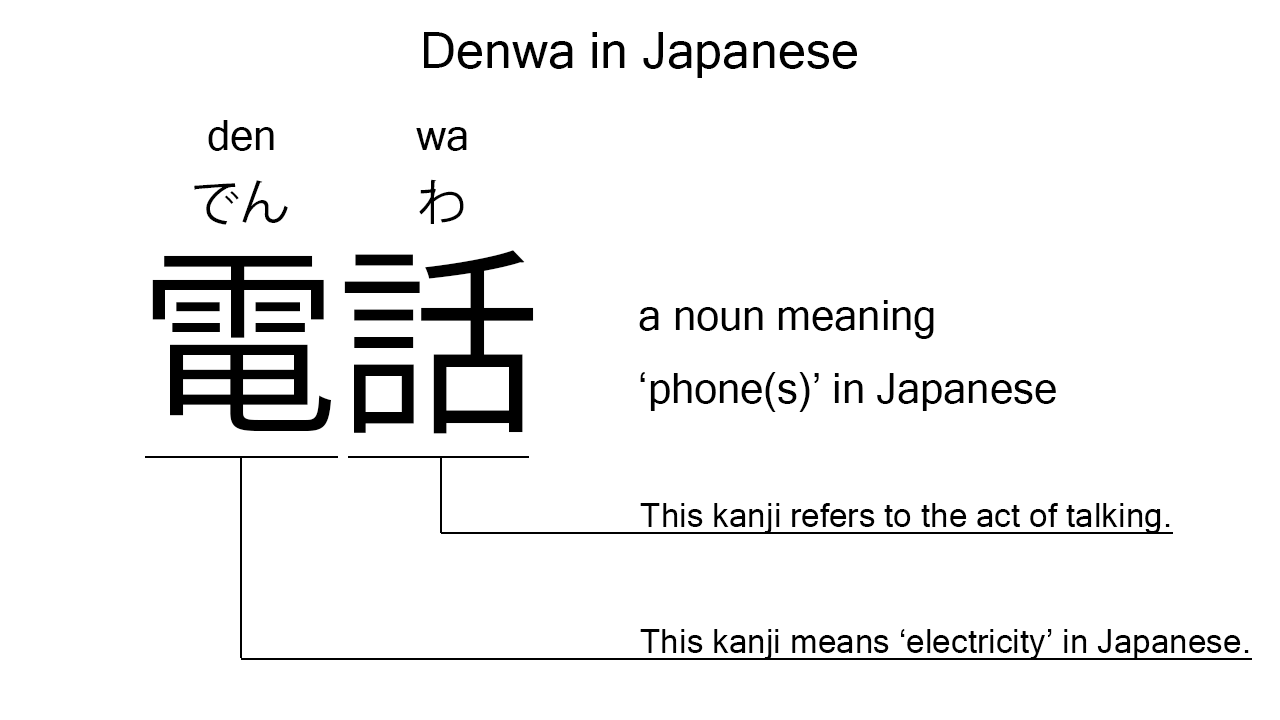What does “denwa” mean in Japanese?
Native speakers say “denwa” often to mean ‘phone’ in Japanese. Perhaps, some Japanese learners know this word as it is sometimes used in Japanese conversations. In this blog post, however, I will explain this word in detail based on its kanji expression. And also, I will explain how to use it through example sentences. My explanations would help Japanese learners understand “denwa” more clearly. Then, let’s get started!
Contents
Definition and meanings of “denwa”
Let me start with the definition and meanings of “denwa”.
- denwa – 電話 (でんわ) : a noun meaning ‘phone’ in Japanese. Depending on the context and situation, this can also mean ‘phone call’. This can also work as plural. Learn more about Japanese plural.
The definition and meanings are simple and clear. To understand this noun more clearly, however, let me explain its kanji characters in detail, one by one.
What does “denwa” literally mean in Japanese?
The kanji expression of “denwa” consists of the following two kanji characters:
- 電 : a kanji character widely used to mean ‘electricity’ in Japanese.
- 話 : a kanji character widely used to refer to the act of talking. This kanji can also be found in other words like “hanasu“.
From these two kanji characters, we can understand that “denwa” literally means ‘electric talking’ in Japanese. This literal interpretation is not completely in line with the actual meanings, but still understandable, I think. We can talk on the phone thanks to electricity.

When we meet new kanji expressions, we should check their kanji characters in detail to understand their meanings clearly and deeply. In many cases, kanji characters tell us a lot about the meanings of the expressions they form. Actually, here, we could get the better understanding of “denwa” through the detailed kanji check above.
So far, I’ve explained the definition and meanings of “denwa” together with its kanji characters. Then, let me explain how to use it through the example sentences below.
Example #1: how to say “phone” in Japanese
watashi wa atarashii denwa wo kat ta – 私は新しい電話を買った (わたしはあたらしいでんわをかった)
I bought a new phone.
Below are the new words used in the example sentence.
- watashi – 私 (わたし) : a pronoun meaning ‘I’ in Japanese.
- wa – は : a binding particle working as a case marker or topic marker. In the example, this works after “watashi” to make the subject in the sentence.
- atarashii – 新しい (あたらしい) : an i-adjective meaning ‘new’ in Japanese. In the example, this works as a modifier to describe “denwa”.
- wo – を : a case particle used to make the object word in a sentence. In the example, this is used after “atarashii denwa” to make the object in the sentence.
- kat – 買っ (かっ) : one conjugation of the verb, “kau“, which means ‘to buy’ or ‘to purchase’ in Japanese. In the example, it has been conjugated for the better connection with its following word.
- ta – た : an auxiliary verb used after a verb, adjective, or auxiliary verb to make its past tense form. Probably, this is well known as a part of Japanese ta form. In the example, this is used after “kat” to make its past tense form, “kat ta”.
This is a typical usage of “denwa”. In this example, it refers to a device which we can use to talk with someone based on the electric technology. When we want to mean a ‘phone’ or ‘phones’ in Japanese, anyway, this noun is a very good option.
Example #2: another usage of “denwa”
kyou kanojo kara denwa ga at ta – 今日彼女から電話があった (きょうかのじょからでんわがあった)
Today, I had a phone call from her.
Below are the new words used in the example sentence.
- kyou – 今日 (きょう) : a noun meaning ‘today’ in Japanese. This can also work as an adverb almost anywhere in a sentence. In the example, this works as an adverb at the beginning of the sentence to say “today” in Japanese.
- kanojo – 彼女 (かのじょ) : a pronoun meaning ‘she’ in Japanese.
- kara – から : a case particle used to say where something starts. Based on this concept, this can also indicate who starts an action. In the example, this is used after “kanojo” to say who called the speaker.
- ga – が : a case particle used to make the subject word or the object word in a sentence. In the example, this is used after “denwa” to make the subject in the sentence.
- at – あっ : one conjugation of the verb, “aru”, which means ‘to exist’ or ‘to be’ in Japanese. This is widely used to say that something exists. In the example, this is used to say that the phone call from her exists.
This is another typical usage of “denwa”. In this example, it is used to refer to the phone call from her, not a device. When we want to mean a ‘phone call’ or ‘phone calls’ in Japanese, this noun is a very good option too.
Summary
In this blog post, I’ve explained the definition and meanings of “denwa” in detail based on its kanji expression. And also, I’ve explained how to use it through the example sentences. Let me summarize them as follows.
- denwa – 電話 (でんわ) : a noun meaning ‘phone’ in Japanese. Depending on the context and situation, this can also mean ‘phone call’. This can also work as plural. These two kanji characters literally mean ‘electric talking’ in Japanese. This literal interpretation is not completely in line with the actual meanings, but still understandable, I think. We can talk on the phone thanks to electricity.
Hope my explanations are understandable and helpful for Japanese learners.